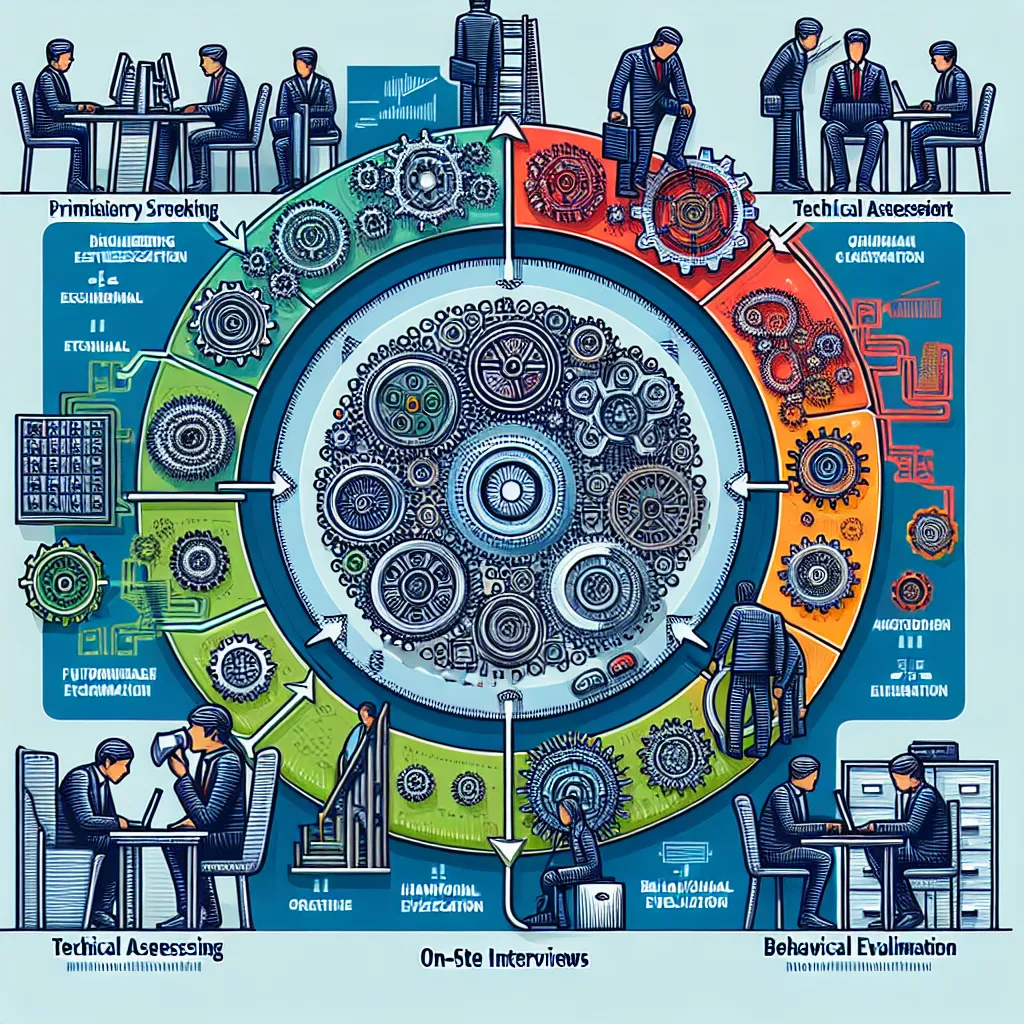Are you gearing up for an administrative interview? Whether you’re a seasoned professional or just starting your career, proper preparation is key to success. This guide will walk you through the essential steps to ace your administrative interview, providing valuable insights and practical tips to help you stand out from the competition.
Understanding the Role of an Administrative Professional
Before diving into interview preparation, it’s crucial to understand the role you’re applying for. Administrative professionals are the backbone of any organization, responsible for a wide range of tasks that keep the office running smoothly.
Key Responsibilities of an Administrative Professional
- Managing schedules and calendars
- Coordinating meetings and events
- Handling correspondence and communications
- Organizing and maintaining files and records
- Providing support to executives and team members
- Overseeing office supplies and equipment
- Assisting with basic bookkeeping and financial tasks
- Greeting visitors and managing reception duties
Understanding these responsibilities will help you tailor your responses during the interview and demonstrate your suitability for the role.
 Administrative Professional at Work
Administrative Professional at Work
Researching the Company and Position
One of the most critical steps in preparing for an administrative interview is conducting thorough research on the company and the specific position you’re applying for.
Company Research
- Visit the company’s website and social media profiles
- Read recent news articles or press releases about the company
- Understand the company’s mission, values, and culture
- Familiarize yourself with the company’s products or services
- Research the company’s competitors and industry trends
Position-Specific Research
- Review the job description carefully
- Identify the key skills and qualifications required
- Research common administrative tools and software used in the industry
- Understand the reporting structure and team dynamics, if possible
This research will not only help you answer questions more effectively but also enable you to ask informed questions during the interview, demonstrating your genuine interest in the role.
Common Administrative Interview Questions and How to Answer Them
Being prepared for common interview questions is essential. Here are some frequently asked questions in administrative interviews, along with tips on how to answer them effectively:
1. “Tell me about your experience in administrative roles.”
Answer: Focus on relevant experience, highlighting specific responsibilities and achievements. Use the STAR method (Situation, Task, Action, Result) to structure your response.
Example: “In my previous role as an administrative assistant at XYZ Company, I was responsible for managing the schedules of three executives. One particular challenge I faced was coordinating a last-minute board meeting with 15 attendees from different time zones. I utilized scheduling software and communicated effectively with all parties to arrange the meeting within 24 hours. As a result, the meeting was a success, and my manager commended my organizational skills.”
2. “How do you prioritize tasks when you have multiple deadlines?”
Answer: Explain your method for organizing and prioritizing tasks, emphasizing your ability to manage time effectively.
Example: “I use a combination of digital tools and traditional methods to prioritize tasks. First, I list all tasks and deadlines in a project management tool. Then, I assess the urgency and importance of each task, considering factors like deadlines, impact on other team members, and overall business objectives. I create a daily to-do list, focusing on high-priority items first. I also build in buffer time for unexpected tasks or emergencies. This approach has helped me consistently meet deadlines and manage multiple projects efficiently.”
3. “Describe a time when you had to deal with a difficult person or situation in the workplace.”
Answer: Use this opportunity to showcase your problem-solving and interpersonal skills.
Example: “In my previous role, I worked with a colleague who was consistently late in providing necessary information for reports I needed to compile. This delay was affecting my ability to meet deadlines. I approached the situation by first having a private conversation with my colleague to understand the reasons for the delays. I then proposed a solution where we would have brief weekly check-ins to discuss upcoming deadlines and any potential obstacles. Additionally, I adjusted my workflow to start compiling reports earlier when possible. This proactive approach improved our working relationship and ensured that deadlines were met consistently.”
4. “What software or tools are you proficient in that are relevant to this role?”
Answer: Highlight your technical skills, focusing on those mentioned in the job description or commonly used in administrative roles.
Example: “I’m proficient in a range of software tools essential for administrative work. I have extensive experience with Microsoft Office Suite, particularly Excel for data analysis and PowerPoint for creating professional presentations. I’m also skilled in using Google Workspace for collaborative projects. Additionally, I have experience with project management tools like Trello and Asana, and scheduling software such as Calendly. I’m always eager to learn new tools and adapt quickly to company-specific software.”
5. “How do you handle confidential information?”
Answer: Emphasize your understanding of the importance of confidentiality and your methods for maintaining it.
Example: “I treat confidentiality with the utmost importance. In my previous roles, I’ve handled sensitive information such as financial data and personnel records. I always adhere to company policies regarding data protection, using secure filing systems and password-protected documents. I’m discreet in my communications and never discuss confidential matters outside of appropriate channels. If I’m ever unsure about the confidentiality of information, I err on the side of caution and seek guidance from my supervisor.”
 Handling Confidential Information
Handling Confidential Information
Preparing for Behavioral Questions
Behavioral questions are common in administrative interviews as they help employers assess how you’ve handled situations in the past. Here are some tips for answering behavioral questions:
- Use the STAR method (Situation, Task, Action, Result)
- Prepare specific examples from your past experiences
- Focus on positive outcomes and learning experiences
- Be concise but provide enough detail to illustrate your skills
Demonstrating Your Skills
During the interview, you’ll want to showcase the key skills that make you an excellent candidate for an administrative role. Here are some essential skills to highlight:
- Organization and time management
- Communication (both written and verbal)
- Problem-solving and critical thinking
- Attention to detail
- Adaptability and flexibility
- Discretion and confidentiality
- Technical proficiency
- Customer service orientation
When discussing these skills, provide concrete examples of how you’ve applied them in previous roles or situations.
Questions to Ask the Interviewer
Preparing thoughtful questions to ask the interviewer demonstrates your interest in the role and company. Here are some examples:
- “Can you describe a typical day in this role?”
- “What are the biggest challenges facing the administrative team currently?”
- “How does the company support professional development for administrative staff?”
- “Can you tell me more about the team I would be working with?”
- “What qualities do your most successful administrative professionals possess?”
Follow-Up Questions and Answers
Here are some potential follow-up questions an interviewer might ask, along with suggested responses:
-
Q: “You mentioned you’re proficient in Excel. Can you give an example of a complex spreadsheet you’ve created?”
A: “Certainly. In my previous role, I created a comprehensive budget tracking spreadsheet that incorporated multiple departments’ expenses. It included formulas for automatic calculations, pivot tables for data analysis, and conditional formatting to highlight variances. This tool significantly improved our financial reporting efficiency.” -
Q: “How do you stay updated on industry trends and new administrative technologies?”
A: “I’m committed to continuous learning. I subscribe to industry newsletters like Admin Pro Forum, follow relevant LinkedIn groups, and attend webinars on new administrative technologies. I also network with other administrative professionals to share best practices and learn about new tools.” -
Q: “Can you describe a situation where you had to maintain confidentiality under pressure?”
A: “In my last position, I was aware of an upcoming company restructuring before it was publicly announced. Despite numerous inquiries from colleagues, I maintained strict confidentiality, redirecting questions to appropriate channels and focusing on my regular duties to avoid arousing suspicion.” -
Q: “How do you handle last-minute changes to your schedule or priorities?”
A: “I approach last-minute changes with flexibility and a positive attitude. I quickly assess the new priority, communicate with affected parties, and adjust my schedule accordingly. I also try to anticipate potential changes by building buffer time into my daily plans.” -
Q: “What strategies do you use to proofread documents effectively?”
A: “I have a multi-step proofreading process. First, I use spelling and grammar checking tools. Then, I read the document aloud to catch awkward phrasing. I also take a short break before my final read-through to approach the document with fresh eyes. For critical documents, I often ask a colleague for a second opinion.”
Common Mistakes to Avoid in Administrative Interviews
Being aware of common pitfalls can help you navigate your interview more successfully. Here are some mistakes to avoid:
- Lack of preparation: Not researching the company or role thoroughly.
- Underestimating the importance of soft skills: Failing to emphasize communication and interpersonal abilities.
- Being too vague: Not providing specific examples to illustrate your skills and experiences.
- Neglecting to showcase technical skills: Failing to highlight proficiency in relevant software and tools.
- Poor body language: Avoiding eye contact, fidgeting, or appearing disinterested.
- Speaking negatively about previous employers: This can be seen as unprofessional and raise red flags.
- Not asking questions: This can make you appear uninterested in the role or company.
- Overlooking the importance of cultural fit: Not demonstrating how your values align with the company’s culture.
Conclusion
Preparing for an administrative interview requires a combination of research, self-reflection, and practice. By understanding the role, researching the company, preparing for common questions, and showcasing your relevant skills, you’ll be well-equipped to make a strong impression. Remember to stay calm, be authentic, and let your enthusiasm for the role shine through. With thorough preparation and a positive attitude, you’ll be well on your way to landing that administrative position.
For more interview preparation tips, check out our guides on how to prepare for a real estate interview and how to discuss your experience in leadership roles. Good luck with your interview!




